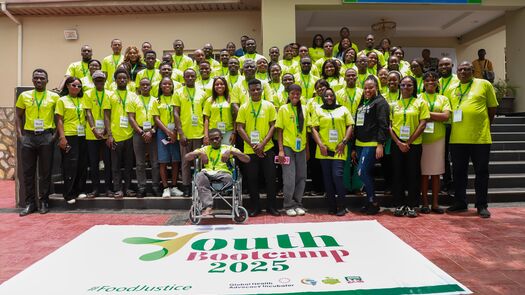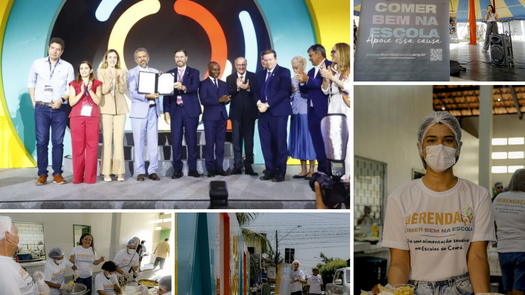November 25, 2025

Munawar Hussain is currently Global Health Advocacy Incubator’s (GHAI) In-Country Coordinator in Pakistan for the Food and Nutrition program. In this role, he oversees partners’ campaigns and activities in the country and assists in their capacity strengthening. Munawar is a program management, monitoring and evaluation and policy expert with more than 20 years of professional experience in sexual reproductive health and nutrition programs.
How did you get involved in public health?
I started working in public health back in 1997, starting with a nutrition program that was aimed at increasing the intake of iodine, which is an essential micronutrient for brain development. And later I worked for several other public health and nutrition programs, including addressing micronutrient deficiencies, clean drinking water, reproductive health and tuberculosis control. Public health became my passion and it's been more than 20 years in the field. I, myself, in fact was a victim of one of the diseases and that was tuberculosis. That in fact always pushed me and motivated me to work more for public health issues. I see that I am by birth an advocate for public health, and I always have this association with me.
Rising obesity in Pakistan is the primary reason for shifting my career to obesity prevention, as noncommunicable diseases are unfortunately an emerging problem, and few people are paying attention. So as an advocate, when I got an opportunity with Global Health Advocacy Incubator, I accepted this responsibility and thought that this is the right time to contribute to the health of Pakistanis, by advocating for policies aimed at reducing the risk factors that are contributing to increased obesity and diseases.
What are some of the most important lessons that you've learned as an advocate?
First, in a public health advocacy campaign, there are several actors, and in my point of view, it is important to map them well and identify your support and opposition to help in designing your campaign. Whenever we are planning a campaign, sometimes the plans are different than the reality on the ground. So, the plan should be flexible enough to adapt to conditions on the ground.
Another learning that I have is that coalition building is a key to success. And this could be done by identifying like-minded organizations and professionals—they would add strength to the campaign and the advocacy process. I take it as a dynamic process as the environment shifts, the commitment changes and the opposition sometimes gears up. So, another lesson that I have learned from my experience in public health advocacy is that advanced planning and preparation is a key to reducing external risks. Those could potentially derail the success of the campaign.
There are two important pillars that I feel are very important. The first is the media. The media can help change the narrative surrounding your campaign objective and as a public health advocate, we must engage them wisely and sustainably. You can always find like-minded people in the media. And the other is civil society. They have a very strong role in dealing with the opposition.
And another very important learning for me is that we need to cultivate champions in the campaign. These could be health professionals, civil society, celebrities or parliamentarians. The champions are the game changers and can help achieve the objectives quickly.
What is the biggest advocacy challenge that you have faced in your career?
I’ve been a part of public health advocacy campaigns a long time, so I've faced several challenges during my career, but I feel the one important to mention is the beverage industry, which is very influential in Pakistan and they are a good test to your nerves. They are well connected to the parliamentarians and even the Prime Minister of the country.
The good thing is that there are several ways to counter industry opposition and their arguments. The advocate should be well prepared with scientific evidence to strengthen the argument and engage a coalition, civil society and the media to counter opposition. In my personal experience, we have been successful in countering the industry narrative during our sugar sweetened beverage tax campaign victory, which was achieved during the recently passed Supplementary Finance Bill 2023, approved by the Government of Pakistan.
It's important to realize that these challenges can occur at any time, and we need to continue our sustainable advocacy to ensure that these challenges are countered at early stages of the campaign. I ask people to stay strong with a very strong sense of self-belief. When you as an advocate are working, you are working for public health, which saves lives, and when it comes to the industry, they are only protecting their corporate interest. So, there is no comparison between your motivation and the industry’s corporate interest. A strong self-believing and well-prepared advocate can always counter challenges like industry opposition.
What accomplishment are you particularly proud of from your work with GHAI?
One particular accomplishment I want to mention is Pakistan's recent tax victory on sugar sweetened beverages through the Supplementary Finance Bill 2023. And despite huge opposition by the beverage industry, we remained successful in increasing the existing tax rate on carbonated beverages and imposition of the new tax on juices, syrups and squashes. I really feel proud of this victory and there is still room to improve. We are striving and making efforts to further enhance the tax. Even though we operated in an environment where the industry is quite influential, we achieved success through our connections, hard work, determination and a very well-structured advocacy campaign.
What's something people don't know about you?
One thing that people might not know about me is that I love plants and one of my all-time favorite things is to spend time gardening. In fact, I really like nature. I really want to live closer to the plants and flowers and foods, and whenever I have some extra time, I always spend it in my garden, where I grow flowers and fruits. When I'm close to nature, when I'm close to the flowers and plants, this activity heals me.



